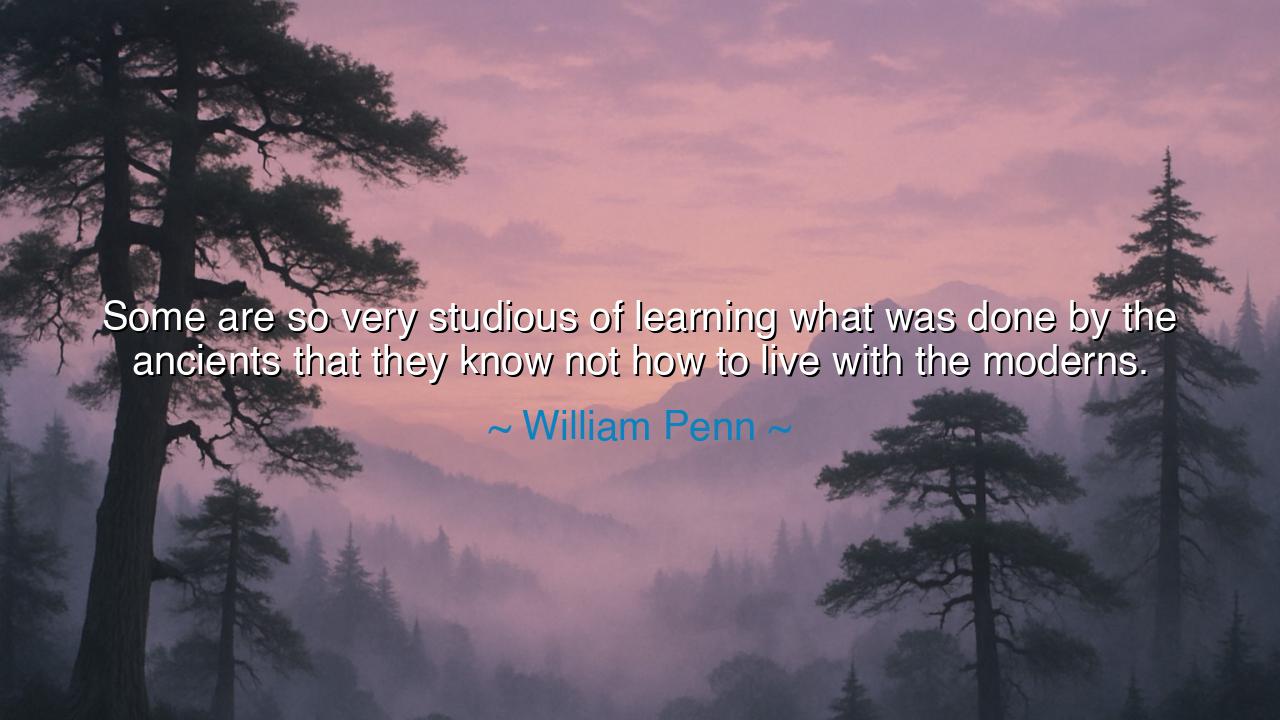
Some are so very studious of learning what was done by the
Some are so very studious of learning what was done by the ancients that they know not how to live with the moderns.






There are truths that whisper through time, reminding the wise that wisdom itself must walk hand in hand with the living present. The Quaker philosopher and statesman William Penn once wrote: “Some are so very studious of learning what was done by the ancients that they know not how to live with the moderns.” In this gentle yet piercing observation lies a lesson for every age — that knowledge without adaptability becomes a burden, and reverence for the past, when taken to excess, blinds the soul to the light of the present.
The meaning of Penn’s words lies in the balance between tradition and progress. He does not mock the study of the ancients, for he himself was a man nourished by history, philosophy, and scripture. Rather, he warns against becoming so devoted to the wisdom of those long gone that one forgets how to act wisely among the living. To learn from the ancients is noble; to be imprisoned by them is folly. Knowledge, like water, must flow — refreshing each generation as it passes. The mind that hoards the past without engaging the present becomes stagnant, unable to breathe the air of its own time.
The origin of this truth can be traced to the age in which Penn lived — a time of great transformation in faith, science, and governance. The world was shifting from the rigid traditions of medieval authority into the dawn of reason and discovery. Many clung to the old ways, quoting Aristotle or the Church Fathers as if no further light could ever appear. But Penn, a man of spiritual courage and practical wisdom, understood that every generation must translate eternal truths into the language of its own experience. What is sacred does not change — but how we live it must evolve.
History bears witness to this struggle between reverence and renewal. Consider the scholars of Alexandria, who once guarded the scrolls of ancient Greece with such devotion that they refused to look beyond them. While they memorized the words of Plato, the world outside their walls was already changing — empires rising, ideas awakening, horizons expanding. Centuries later, the same could be said of the medieval universities, where thinkers repeated Aristotle’s theories while Galileo watched the stars move in patterns that defied old belief. The lesson is clear: the wisdom of the past is a torch, not a chain. It must illuminate the path forward, not tether the traveler to what is behind.
Even the most revered teachers knew this. Socrates, though ancient himself, did not worship the wisdom that came before him; he questioned it. Jesus, too, did not destroy the Law of Moses — He fulfilled it by giving it life for His own time. So must every generation interpret the past anew, taking what is eternal and clothing it in relevance. To live wisely is not to reject the ancients, but to listen to them with the ear of the present, to let their truths breathe through the changing winds of human progress.
Penn’s words also carry a personal challenge to each soul. Many people live in memory, clinging to what once was — the lessons of their youth, the teachings of their forebears, the “way things used to be.” Yet, to live fully is to engage the world as it is, not as it was. The world belongs neither to the past nor to the future, but to those who can learn from both and walk wisely in the now. True learning is not a museum of thoughts but a living garden, where ancient seeds grow in modern soil.
Let this be the lesson for all who seek wisdom: honor the past, but dwell not within it. Study the ancients, but let their words inspire creation, not imitation. Seek to understand what they meant, not merely what they said. And when the world changes, do not lament — adapt with courage and grace, as the ancients themselves once did when they faced the unknown. For wisdom is eternal only because it renews itself in every age. As William Penn reminds us, knowledge that does not learn to live becomes lifeless — but the soul that learns to live wisely among the moderns carries the eternal flame of truth forward into the dawn.






AAdministratorAdministrator
Welcome, honored guests. Please leave a comment, we will respond soon